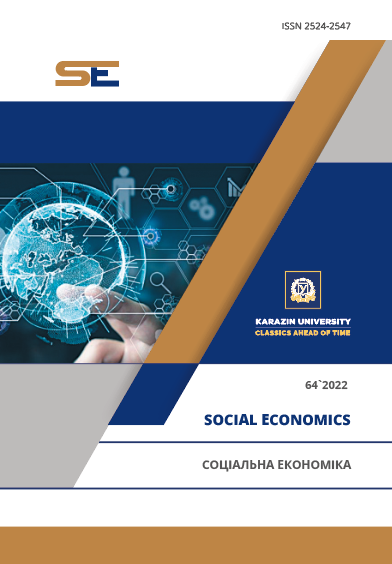СОЦІАЛЬНИЙ КАПІТАЛ ЯК ДЖЕРЕЛО ІНДИВІДУАЛЬНО-КОЛЕКТИВНОЇ ЕКОНОМІЧНОЇ СТІЙКОСТІ
Анотація
Успішний та прогресивний розвиток соціально-економічних орієнтованих, політичних, профільних реформ зумовлено ступенем рівня та розповсюдження довіри і поваги до фундаментальних інституцій, орієнтованих на формування національно-ціннісних пріоритетах згуртованості, співпраці, взаємодопомоги, просування позитивного результативного шляху і іміджу та надійного партнерства, які, особливо, необхідні сьогодні незламній Україні, яка переживає тяжкі часи. Соціальний капітал впливає на всі сфери життя, соціально-культурні, економіко-стратегічні, політичні, правові та інші направлення мають за основу цілеспрямоване зосередження на людині, на підняття рівня добробуту та збереження всесвіту для майбутніх поколінь. Соціальний капітал досить не вивчена економічна складова, досі немає остаточного визначення, розподілу видів і класифікацій, одною із обговорюваних тем в наукових колах є вимір цього виду капіталу. В статті пропонується визначення поняття «соціальний капітал» автора та аналіз напрямків і аспектів наукових дослідників цього виду капіталу, джерела, напрямки використання, принципи, види взаємозв’язку в суспільстві, які є джерелом індивідуально-колективної економічної стійкості. Порівняльний аналіз соціально-економічного зростання та розвитку соціального капіталу доводить взаємозв’язок та тісне переплетіння єдиних цілей та завдань, взаємозаміну і доповнення один одного. Поведінкові ситуативні компоненти соціальних зв’язків і кооперативних взаємодій, внутрішній стрижень стресостійкості, рівень освіченості і розуміння допомагають спільноті долати кризові ситуації і негаразди української дійсності та реаліях сьогодення України. Саме соціальний капітал розглядається, як ресурс реальних сприянь на позитивний фактор формування та розвитку чіткої парадигми розвитку соціально-економічного клімату українського суспільства, бізнесу, держави.
Завантаження
Посилання
Coleman, J. (2001). Capital is social and human. Social Sciences and Modernity, 3, 122 -139. (in Ukrainian)
Bourdieu, P. (2002). Forms of capital. Economic socioloia, 3(5), 60-74.
Kozhemyakina, O. M. (2016). Trust and social capital: spatial value-normative interpretation. Demography and Social Economics, 1, 118–131 . (in Ukrainian)
Gugnin, E., & Chepak, V. (2001). The phenomenon of social capital. Sociology: theory, methods, marketing, 1, 49–57. (in Ukrainian)
Levchuk, N. M. (2011). Antisocial phenomena as a result of the deficit of social capital in Ukraine. Ukrainian society, 1, 135–147. (in Ukrainian)
Shapovalova, T. (2013). Influence of social capital on economic growth. Economic analysis, 14(1), 167–175. (in Ukrainian)
Koba, N. V. (2013). The influence of social capital on the process of commercialization of knowledge in organizations. Business Inform, 9, 208–214. (in Ukrainian)
Roskolotko, I. (2013). Social capital as a productive resource of social ties. Actual problems of public administration, 2, 17–20. (in Ukrainian)
Salikhov, B. V., & Neymatova, B. A. (2008). Functional structure of the intellectual capital of the enterprise as an object of management. Creative Economy, 11 (23), 50–58. (in Ukrainian)
Sereda, Y. V. (2015). The role of social capital in shaping the attitude to the market economy in Ukraine. Economics and forecasting, 2, 72–89. (in Ukrainian)
Fukuyama, F. (2006). Trust: social virtues and ways of reporting : per eng. M.:. ACT Keeper, 2006.
Rogozhin, O. G., & Makarenko, I. P. (2013). Innovative social capital: issues of identification and measurement. Demography and Social Economics, 2, 82–92. (in Ukrainian)
Buddychuk, A. O. (2012). Ownership and capital: essence, structure and basic functions. Bulletin of Ivan Franko Zhytomyr State University, 63, 48–52. (in Ukrainian)
Poitnam, R. (1993). The Prosperous Community. Social Capital and Public Life. The American Prospect, 4(13), 1–2.
Ryabinina, N. O. (2022). Convergence of social capital of economic development of Ukraine and state bodies on the way of European integration. Scientific Bulletin of Uzhhorod National University. Series. International relations and world economy, 44, 69-77. doi: https://doi.org/10.32782/2413-9971/2022-44-11
Timokhova, G. B. (Ed.). (2019). Social capital as a factor in the economic growth of society: the institutional aspect of analysis: monograph. Kharkiv: Publishing house of NUA, 2019. Retrieved from http://dspace.nua.kharkov.ua/jspui/bitstream/123456789/2135/1/Timokh_06.pdf. (in Ukrainian)
Razak, A. (2016). Theory of knowledge exchange in business strategy. Economics of Procedures and Finance, 37, 545-553. (in Ukrainian)
Dzhedzhula, V., Gurochkina, V., Epifanova, I., & Telnov, A. (2022). Fuzzy technologies for modeling social capital in a developing economy. WSEAS Transactions on Business and Economics, 19, 915-923. DOI: https://doi.org/10.37394/23207.2022.19.80
Нurochkina, V. V. (2019). Razvitie man’s capital was the basis of innovative activity of enterprise. MNC Modern paradigms of development of the national and world economy. CHIȘINĂU, Republic of Moldova Materials MNC 2019 (pp. 528-534). Retrieved from https://www.researchgate.net/publication/339339926. (in Ukrainian)
Нurochkina, V., Reshmidilova, S., Bogatchik, L., Telnov, A., Skorobogata, L., & Ryabinina, N. (2021). Modeling effectiveness of financial support for the social capital development in economic emergence. WSEAS Transactions on Environment and Development, 17, 262–270. DOI: https://doi.org/10.37394/232015.2021.17.27
Tulenty, D., Likhouzova, Т., & Riabinina, N. (2022). Searching for Hidden Connections between the Evolution of Poverty in Developing Countries and Information Technology. International Journal of Inno-vation and Technology Management, 19, 06, 2250018. DOI: https://doi.org/10.1142/S0219877022500183
Larina, T. O. (2007). Resilience as a life task of the individual. Actual problems of psychology: Psychological hermeneutics, 2(5), 131‒138. (in Ukrainian)





